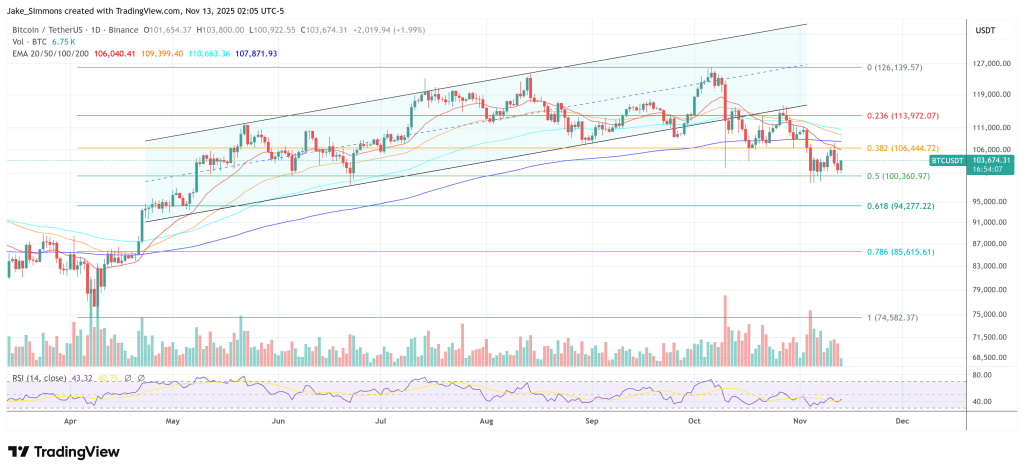
Taiwan edged closer to a formal Bitcoin policy this week after Premier Cho Jung-tai and Central Bank Governor Yang Chin-long signaled support—at a minimum—for studying Bitcoin as a strategic reserve asset, accelerating pro-BTC rulemaking, and piloting treasury exposure using government-seized coins.
The push was catalyzed by tech legislator Ko Ju-chun, who published the commitments following an interpellation at the Legislative Yuan’s Finance Committee on November 11, 2025, and by statements amplified by Bitcoin infrastructure firm JAN3. While no statutory change has yet been enacted, the on-record commitments mark Taiwan’s clearest move to date toward integrating Bitcoin into sovereign asset and regulatory strategy.
Taiwan Signals Bitcoin Pivot
In remarks and posts summarizing the session, JAN3 called it “a major milestone for Bitcoin in Asia,” saying “the Premier and Central Bank of Taiwan have agreed to study Bitcoin as a strategic reserve, draft pro-Bitcoin regulations, and pilot BTC treasury holdings starting with seized Bitcoin,” crediting Ko’s initiative and support from JAN3 CEO Samson Mow.
Ko posted via X: “Taiwan breakthrough! Premier & CBC commit to: study Bitcoin as strategic reserve, draft BTC-friendly rules in 6 mos [and] pilot BTC treasury holdings—starting with inventorying seized BTC awaiting auction!”
🚨 Taiwan breakthrough! Premier & CBC commit to:
1️⃣ Study #Bitcoin as strategic reserve
2️⃣ Draft BTC-friendly rules in 6 mos
3️⃣ Pilot BTC treasury holdings—starting with inventorying seized BTC awaiting auction!
Led by @dAAAb . #BTC fam, let’s make TW the Asia hub! 🇹🇼⚡… pic.twitter.com/OtczhWt8LK— 科技立委葛如鈞 Ko Ju-Chun (@dAAAb) November 12, 2025
The Finance Committee exchange—posted in full by Ko—centered on two immediate deliverables. First, an inventory and year-end audit of all Bitcoin already confiscated by Taiwan’s judicial authorities, with a view to refraining from near-term disposals and using the stock as a controlled treasury pilot.
In Ko’s words: “can we take a step back and discuss whether we can continue to hold these confiscated virtual currencies that do not need to be returned, like other countries?” Premier Cho responded that “an inventory is necessary […] I can say that we’ll give everyone an answer by the end of the year,” while Governor Yang agreed to provide a “detailed report before the end of the year” setting out both pros and cons of a Bitcoin strategic reserve.
Those pledges imply a structured report from the Central Bank and Executive Yuan by December 31, 2025, and an inter-agency audit of seized-asset balances over the same window. Second, the committee pressed for a regulatory calendar.
Ko asked for a six-month window to deliver “BTC-friendly rules,” tying the request to Taiwan’s broader Virtual Asset Service Provider framework and a pending special law that would consolidate licensing, market-conduct, and stablecoin oversight.
The Financial Supervisory Commission (FSC) has been working toward that endpoint: a Draft Act disclosed this spring would require VASP approvals, allow certain financial institutions to run concurrent virtual-asset businesses, and set licensing and internal-control baselines. Business groups and legal commentators have since described the measure as Taiwan’s most comprehensive crypto bill to date and the likely vehicle for any Bitcoin-treasury and custody standards that may emerge from the pilot.
Ko’s case for strategic reserves blended macro and market structure points. He noted that Taiwan’s sovereign asset mix is heavily concentrated in US dollar assets—citing earlier Central Bank testimony—and warned that NT$ appreciation versus USD erodes purchasing power for domestic institutions, pointing to an FSC brief that tied this year’s NT$ moves to depressed bank profits.
He argued BTC should be treated as additive—“gold and Bitcoin […] are not mutually exclusive; they can coexist”—and emphasized declining BTC volatility alongside liquidity and seizure-resistance considerations in extreme scenarios. That framing mirrors his public campaign throughout 2025, in which he floated allocations ranging from 0.1% of GDP to as much as 5% of reserves as part of a diversified basket alongside gold and FX.
The seized-Bitcoin pilot is the near-term hinge. Taiwan has periodically auctioned confiscated crypto; Ko contended that a 2024 batch, if retained, would have appreciated materially given BTC’s price path, and he urged the Executive Yuan to treat such balances as policy sandboxes for custody, accounting, risk, and disclosure—before any net-new purchases are contemplated.
At press time, BTC traded at $103,674.



















